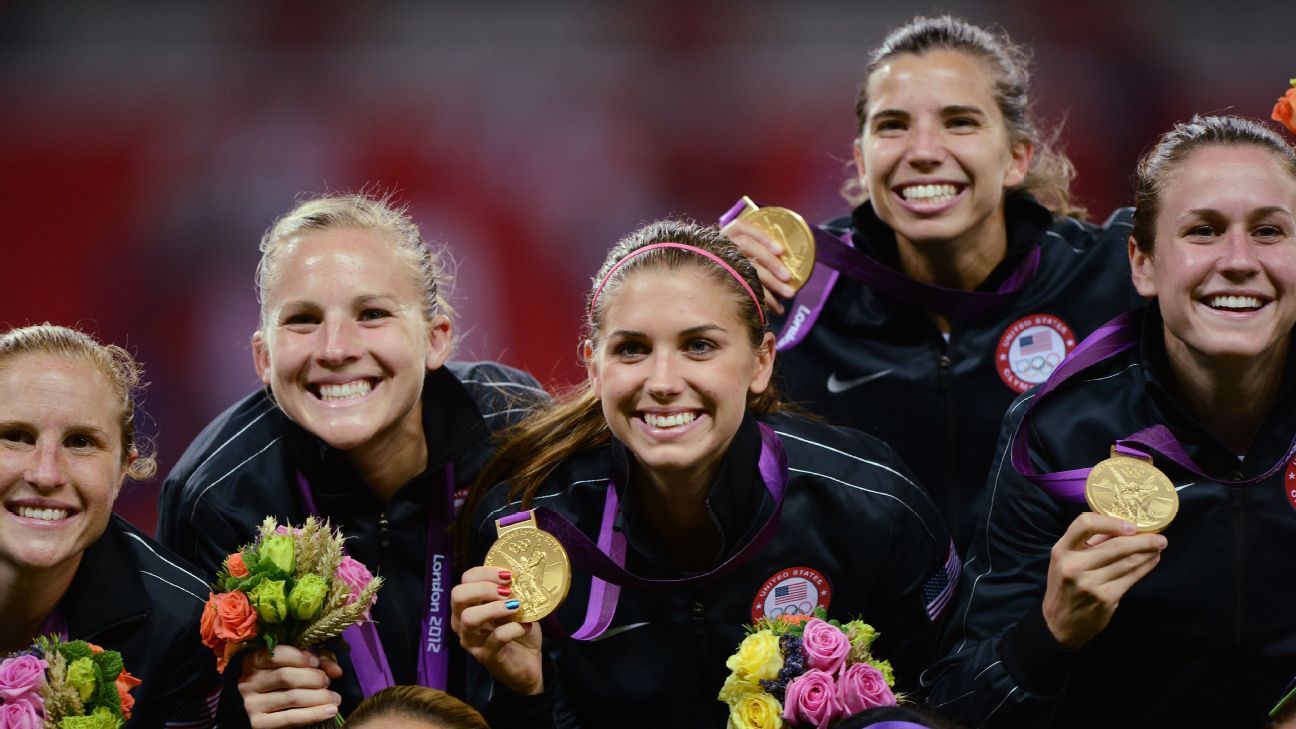When the U.S. women’s national team finally begins its Olympic campaign in Japan, it will be the massive favorite. There are some good reasons for that, including its No. 1 world ranking and its title as the reigning World Cup champion.
But there’s an even better reason: there’s just not a ton of competition. With only 12 teams in the entire tournament, many of the best teams in the world won’t even be there.
Germany, the gold-medal winner of the 2016 Olympics and the No. 2-ranked team in the world? It’ll be watching from home.
France, the world’s No. 3-ranked team with seven players in ESPN FC’s Women’s Rank, the most of any country aside from the U.S.? Also at home.
So, why won’t the best teams be there?
The short answer is that the women’s soccer tournament is too small and governing bodies haven’t seemed to mind. With just 12 teams, it’s smaller than the men’s Olympic tournament and has room for just three participants from Europe, the dominant region of the world.
– Stream ESPN FC Daily on ESPN+ (U.S. only)
– Don’t have ESPN? Get instant access
Even worse, there’s no qualification tournament for European teams, which sends a signal of complacency and reduced expectations.
While the men’s teams all have regional qualifiers and fight for their spot at the Olympics, placement at the previous Women’s World Cup decides which European teams compete at the following Olympics. Seven of the eight quarterfinalists at the 2019 Women’s World Cup were from Europe.
So, when France lost to the U.S. team in an electric, thrilling quarterfinal match in Paris, it got hit with a double whammy: it was not only out of the 2019 World Cup, it was out of the 2020 Olympics, meaning it wouldn’t get to compete in another major tournament until the European Championship in 2022 at the earliest.
“There has to be something that changes this,” former U.S. team captain Abby Wambach tweeted at the time. “UEFA needs to spend the money and do a proper qualifying tournament. France is too good not to be at Olympics. Total shame.”
That’s not to say there won’t be any good teams in Japan. The U.S team’s opening game will be against Sweden, the team that knocked the U.S. out in 2016. The Netherlands, the team that reached the 2019 Women’s World Cup final, will also feature.
But if the U.S. wants to reach its fifth-ever gold-medal match, it has to get through a three-game group stage in which merely coming in third place in a four-team group is enough to advance, and then just two knockout games. It’s not exactly a robust competition — the Women’s Euros are tougher — and it will only continue to lose relevance as the Women’s World Cup expands to 32 teams in 2023.
So, can it be fixed?
The International Olympic Committee has no excuse for keeping the women’s soccer tournament at just 12 teams. The men’s tournament features 16 and fits into the Olympic schedule just fine, especially because most of the soccer tournaments take place outside the host city.
Critics say there is simply no time for a proper qualification tournament in Europe because quickly after the World Cup, teams start using their international windows on European Championship qualifiers, which take months. But that’s only true if UEFA is unwilling to tweak its calendar slightly.
CONCACAF’s Olympic qualification tournament, for instance, happens in just one FIFA window. UEFA has more teams, but there’s no reason it can’t stage a similarly truncated event with World Cup placement or world rankings serving to weed out teams and avoid drawn-out early rounds.
It might require a little effort, but making the Olympic women’s soccer tournament bigger and more prestigious would be good for everyone.
Women’s soccer as a whole lacks events with consequential games, and the sport needs more high-stakes competition. While European teams have the Euros, there’s otherwise a dearth outside of the World Cup and the Olympics, and national teams can only grow and garner more investment if they play games.
At the same time, the IOC would benefit from women’s soccer earning a higher profile at the Olympics. The U.S. team, for instance, garnered record TV ratings for NBC in 2012 — the last time it won a gold medal — which translate to more value for the IOC. The Women’s World Cup in 2019 drew record TV ratings around the globe. As the interest in women’s soccer grows, the IOC would be foolish to not want to join in.
To be sure, the IOC wouldn’t want to face backlash from FIFA if women’s Olympic soccer became as prestigious as the Women’s World Cup. On the men’s side, FIFA has required the Olympics serve mostly as a U23 event to avoid overshadowing the World Cup. The women, on the other hand, compete with their full senior squads.
But the IOC probably won’t have to worry about that.
For FIFA to feel compelled to water down the women’s Olympic tournament, it would first need to know the value of the Women’s World Cup, which it does not and has shown little interest in finding out. That’s why FIFA assigns all its World Cup revenue to the men’s version of the tournament, and no one can say how much the women’s tournament generates.
The women’s soccer community, by revering the Olympics as the No. 2 event in the sport behind the World Cup, has done its part to help soccer blossom at the Olympics. Now it’s time for the IOC to return the favor and expand the women’s field to be on par with the size of the men’s tournament, or make it even bigger.
It’s the least it can do.
